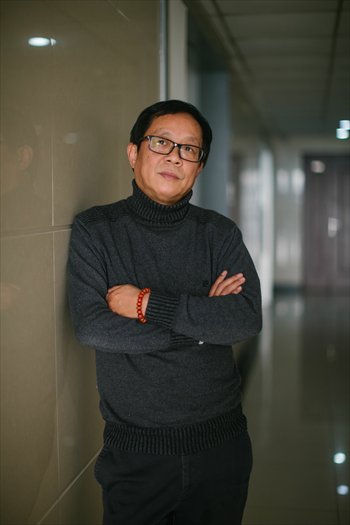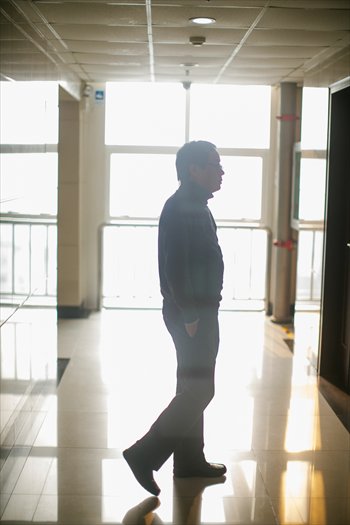Meng Lin, who has lived with AIDS for 20 years, fights for the rights of HIV-positive people

Meng Lin, who used to hide from the media's cameras, has started to show his face to the public. Photo: Li Hao/GT
He is known as China's longest surviving AIDS patient. He is also something of a celebrity among Chinese people living with HIV/AIDS (PLWHA) not only due to his longevity, but because of the decade he has spent devoting himself to seeking equal rights for PLWHA.
Meng Lin, 48, a Beijinger who was diagnosed with AIDS 20 years ago, founded the China Alliance of People Living with HIV/AIDS (CAP+) in 2006, an NGO which has expanded to 109 affiliates across the country, covering 62,800 PLWHA.
But in a recent interview with the Global Times, Meng said he plans to quit CAP+ and commit himself to a business which is dedicated to providing comprehensive services to PLWHA, including medical treatment, psychological counseling and legal advice.
"I feel exhausted from my grass-roots undertakings," he said, citing the difficulties faced by an NGO that lacks official legal standing and a stable source of funding.
They have made several unsuccessful attempts to register CAP+ at municipal bureaus of civil affairs, he explained. Furthermore, he said its sources of funding, mainly overseas NGOs, have become unstable as the authorities tighten their scrutiny of domestic NGOs with foreign connections.
Another factor that has disappointed Meng is the slow progress being made in the country's AIDS control and prevention measures, as well as with the efforts in fighting against the social stigma associated with the disease.
"The number of newly infected cases is still increasing rapidly," he lamented. According to the latest official statistics, there were 97,000 new HIV/AIDS cases in the first 10 months of this year, 11.5 percent more than in the same period last year.
"The major problem doesn't lie in the stigma, but in law enforcement," he noted.
Even though the law stipulates that PLWHA should enjoy equal rights to medical treatment and employment, patients are often illegally rejected by hospitals or employers, he said.
"There's no legal clause regarding penalties for those law-breakers, and they are seldom punished or prosecuted," he said. "These situations force PLWHA underground and increase the risk of transmission."

Meng Lin, who used to hide from the media's cameras, has started to show his face to the public. Photo: Li Hao/GT
Transformation
With a registered capital of 3 million yuan ($466,000), Meng established Beijing Ark of Love Technology Co. Ltd in August, along with seven other shareholders from the health, community service and professional management sectors.
"The number of AIDS patients is increasing and their physical and psychological need to enjoy private, profound and professional services are also increasing," he said, adding that they have developed an app and plan to promote it to the public next month.
By installing the app and paying a fee, members can enjoy a range of services. But Meng declined to reveal the exact fee, saying only that "it will be low."
After engaging in activism for PLWHA for years, he has accumulated experience and connections with leading medical staff, government officials and NGO managers as well as sponsors from China and abroad.
Currently, he is in the process of handing over the directorship of CAP+. He said Ark of Love shareholders have agreed that part of the profits will go to public welfare causes for PLWHA.
Bitter past
Almost every day, people seeking different kinds of help approach Meng through social media, by phone or by visiting his office at CAP+, which is headquartered inside Beijing You'an Hospital, a hospital for AIDS patients. Some ask for donations, while others want assistance in making complaints.
Meng said he has responded to some but turned away many others.
He said he has donated nearly 500,000 yuan to poor individuals.
"I couldn't help them all. I sometimes chose to turn a blind eye. It's tiring and upsetting to hear so many negative stories," he said.
He shares a bitter past in common with many other PLWHA.
In 1995, Meng, the youngest son of a big family in Beijing, started to suffer hair loss, physical weakness and rashes before he was diagnosed with AIDS, a disease which was then rarely seen in China and wrongly considered at the time and now to be highly contagious and untreatable.
At that time, "cocktail therapy," an effective anti-HIV treatment invented in 1996, was still being developed.
The family refused to accept him when they found out about his homosexuality and disease. After having a final dinner with them on the eve of Chinese lunar new year, he left home.
But he never gave up on life. In early 1996, locked in a room beside a morgue, he took part in a three-month drug test at You'an Hospital with three other AIDS patients. One of them committed suicide, and the other two died months later.
When he learned of the arrival of "cocktail therapy," he sold his house and spent nearly all his savings on buying medicines from the US, which came at the astronomical price of 240,000 yuan a year.
China started to provide free anti-HIV drugs in 2003, but it was only after 2009 that second-line drugs were included in the free antiretroviral medicine list. Before 2009, Meng still had to seek medicines from foreign countries.
In 2005, some foreign NGOs approached him, offering him free medicine if he became involved in their work. Meng agreed.
Live free
Wearing a black polo neck sweater and sporting a black-framed pair of glasses, Meng looked healthy in his new office in a tall building in Fengtai district in Beijing. Many patients want to know his "recipe" for maintaining health.
Apart from taking drugs regularly, he thinks a positive attitude is essential. He had always hidden his face from media for fear of being recognized by friends and neighbors. But last year, his view started to change.
"Evading the problem won't solve it. I have to confront them," he said. He has become more bold in expressing his views.
On his Sina Weibo, he shared his sadness about breaking up with his boyfriend, asked for a guy to spend Valentine's Day with, poked fun at society for always making moral judgments about people infected with HIV and reposted stories about the injustices faced by AIDS patients.
"I know I have drawn some criticisms. But I don't care. This is my lifestyle," he said.
Some of his siblings have resumed contact with him in recent years. But apart from his three dogs, he always spends Spring Festival alone.
He declines to join gatherings hosted by his friends. "It's very awkward when people ask 'Are you married? What does your wife do? How old is your child?'" he said.
Although now living publicly, he still uses different names in his three different circles - AIDS patients, the gay community, and friends and relatives, and has tried his best to prevent them mixing with each other.
Newspaper headline: I will survive